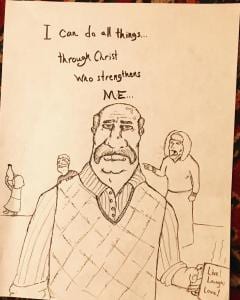Yesterday was a long day and so I am late bellying up to the morning blog, trying to gather my wits and my words. I read a lot—real books mind you—and drove children in all the directions, and cleaned my house, and did some other things. And then, at the very end of the day, I came across this short Twitter clip:
What?….Platt's McLean Bible Church teaches Revoice/Living Out nonsense that Jesus had body dysphoria similar to "transgender" people. pic.twitter.com/XqEyYrtMPd
— Terri Green (@TerriGreenUSA) January 4, 2022
I trust you have watched it, but in a nutshell, it’s a well-produced (as in a higher production value than anything I could possibly achieve sitting in my nook with my iPhone propped up on a bookshelf) clip of a pastor authoritatively explaining how Jesus experienced “dysphoria” in his body because of having to “experience” sin on the cross. Jesus, says this Pastor quoting I Peter 2:24, “bore our sins in his body on the tree, that we might die to sin and live to righteousness, by his wounds we have been healed.” In bearing our sins in his body, “Jesus experienced something completely foreign to his understanding of who he is.”
This “experience” says the pastor, will be a comfort to those people experiencing gender dysphoria, and transgender people in general. The clip was produced, ostensibly, to help Christians sort out how to “love” their “transgender neighbor.” Jesus, he explains, is “the only hope” and in him, “our transgender neighbors find a friend closer than anyone else. “We have a savior,” he explains, “who has experienced the ultimate feeling of not belonging in his body.”
If you are not a person who spends any time on Twitter (which I hope is the case, because that is the sensible way), you may not know that there have been arguments over the last two weeks about what pastors should be allowed or not allowed to weigh in on. Some people have tweeted that pastors should not be consulted very much over matters of mental health. If you are depressed or in a bad way, you would be better off seeing a counselor than a pastor, because pastors “lack expertise” in fields of mental health.
Moreover, pastors should not weigh in subjects pertaining to fields of history and economic philosophy. If you aren’t a historian by trade, so the tweeting goes, you shouldn’t say anything about communism or Gramsci. Pastors, unlike historians and everyone else, should stay in their lanes.
One of the books I happen to be rereading—oh my word it’s so good—is Generation to Generation: Family Process in Church and Synagogue by Edwin Friedman. In the first few pages, Friedman undoes that first specious idea, that pastors shouldn’t be consulted because they are not experts in everything. In point of fact, Friedman explains, being an expert in everything is not what the pastor is supposed to do, and will be a waste of time. But he should be consulted in questions of mental health because of the spiritual place he holds in the life of a congregation. I’m going to blog about this more later because it’s so, as they say, relevant to everything. But I need to better marshal my thoughts before I wade in.
On the second point, whether pastors should be allowed to talk about history, well, I suppose I would say, and largely because of the clip we are considering today, it should be allowed on a case by case basis. In the olden days, pastors were scholars in their own right (at least in the world I come from) and were not meant to indulge in the peculiar brand of anti-intellectualism that Americans seem so much to love. I personally love watching clips of preachers in small, badly lit converted office buildings banging on their pulpits and shouting that if it’s in a Bible you should just believe it because they’re telling you. My favorite is the pisseth against the wall guy. But that ought not be the norm. It is good to go to seminary and study hard and to be well-read for the particular and very important reason that, in order to shepherd the flock, you must know what the flock thinks and where they’re getting their thoughts. If everyone in your church is reading Gramsci, for instance, or people who have been formed by reading a lot of Gramsci, you had better read and understand Gramsci.
So, in this case, it would be important to be up to date on the question of transgenderism. What is it that people are saying in these latter days when they talk about their experience of being in the body? Why do so many people suddenly feel so uncomfortable? Whence ariseth the feelings and the ideas both? But the pastor must not stop there. He must rush headlong to the scriptures and consult the text. And—and this is so so so important—he must not misuse the text. He must so know how to read the scriptures and interpret them as not to do violence to them in the way that so many people today want to do violence to the human body. In his desire to love the people in his sway, he must not just say things as if they come from the scriptures when, in point of verifiable fact, they do not come from the scriptures.
So anyway, Jesus did not “experience” sin as this pastor says. And he did not suffer “dysphoria.” That the Son of God picked up and bore the sins of the world at the cross, suffering the consequences of sin—death—in his body, cannot be made to correspond to the experience of gender dysphoria.
Does that mean, then, that transgender people cannot hear the gospel? Of Course Not. It is possible to pastorally love people no matter who they are and what they think and feel. And the scriptures are the place from which to derive that comfort. And the cross is the place to go. But not by changing Jesus into the image and likeness of the zeitgeist.
And now, I am sorry to say, I have to go do other things. Hopefully, I will have more to say on all these important matters very soon. Have a nice day!













